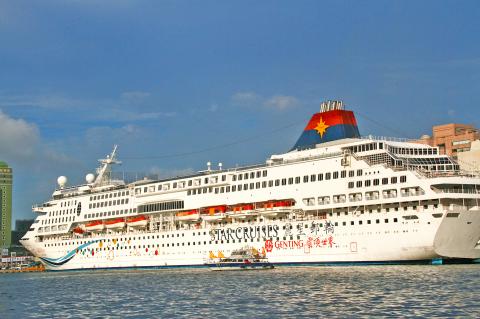No international cruise ships would be allowed to make port calls in the nation, effective immediately, after a Taiwanese woman on board the Diamond Princess was yesterday confirmed to have the 2019 novel coronavirus (2019 n-CoV), Minister of Health and Welfare Chen Shih-chung (陳時中) said yesterday.
Chen made the announcement at a weekly news conference at the Executive Yuan in response to media queries on what the government’s plans are with the new confirmed case.
Kyodo News yesterday reported that 10 more passengers onboard the Princess Diamond, aged between 50 and 70, had been confirmed to have 2019 n-CoV, including a Taiwanese woman.

Photo: Lin Hsin-han, Taipei Times
The decision was made after experts at a Central Epidemic Command Center meeting yesterday agreed that it would be almost impossible to manage passengers on cruise ships, who are constantly boarding and disembarking, Chen said.
Furthermore, if there is a carrier of the virus on board, it would cause serious cross-infections, he said.
The command center regretted having to issue the ban, he said.
Later in the day, when asked by reporters how the center plans to deal with more than 1,700 Taiwanese onboard the SuperStar Aquarius (寶瓶星號) of Star Cruises (麗星郵輪) scheduled to return to the Port of Keelung today, Chen said that he would allow the Taiwanese entry on the condition that they be placed under home quarantine for 14 days.
Any passengers displaying pneumonia-like symptoms would be immediately quarantined by disease prevention personnel, he added.
Star Cruises said that the 1,738 passengers onboard the Aquarius include 1,709 Taiwanese, 18 Filipinos, three Malaysians, three Vietnamese, a South Korean, a Burmese, an Indonesian, a Singaporean and a Chinese spouse who had not travelled outside of Taiwan in the two weeks before the trip.
The ship was docked in Naha, Japan, on Tuesday and Wednesday after departing from Keelung on Monday, the company said.
In related news, Chen said that 1.6 million masks had been delivered to pharmacies and health centers nationwide yesterday as a rationing system that asks people to show their National Identification card, National Health Insurance card or permanent residency certificates when buying masks went into effect.
The nation’s factories are producing about 3.2 million masks daily, he said.
Asked if the government has maintained its target to produce 10 million masks by the middle of next month, Chen said that it has.
The Ministry of Economic Affairs is making an all-out effort to procure machinery for making masks from other nations, he said.
The supply target could be adjusted according to demand, he said, adding that the nation has sufficient materials to produce masks.
As of 9:30pm yesterday, Taiwan has confirmed 16 infection cases, the center said.
Additional reporting by CNA

FREEDOM OF NAVIGATION: The UK would continue to reinforce ties with Taiwan ‘in a wide range of areas’ as a part of a ‘strong unofficial relationship,’ a paper said The UK plans to conduct more freedom of navigation operations in the Taiwan Strait and the South China Sea, British Secretary of State for Foreign, Commonwealth and Development Affairs David Lammy told the British House of Commons on Tuesday. British Member of Parliament Desmond Swayne said that the Royal Navy’s HMS Spey had passed through the Taiwan Strait “in pursuit of vital international freedom of navigation in the South China Sea.” Swayne asked Lammy whether he agreed that it was “proper and lawful” to do so, and if the UK would continue to carry out similar operations. Lammy replied “yes” to both questions. The

‘OF COURSE A COUNTRY’: The president outlined that Taiwan has all the necessary features of a nation, including citizens, land, government and sovereignty President William Lai (賴清德) discussed the meaning of “nation” during a speech in New Taipei City last night, emphasizing that Taiwan is a country as he condemned China’s misinterpretation of UN Resolution 2758. The speech was the first in a series of 10 that Lai is scheduled to give across Taiwan. It is the responsibility of Taiwanese citizens to stand united to defend their national sovereignty, democracy, liberty, way of life and the future of the next generation, Lai said. This is the most important legacy the people of this era could pass on to future generations, he said. Lai went on to discuss

AMENDMENT: Climate change is expected to increase the frequency of high-temperature days, affecting economic productivity and public health, experts said The Central Weather Administration (CWA) is considering amending the Meteorological Act (氣象法) to classify “high temperatures” as “hazardous weather,” providing a legal basis for work or school closures due to extreme heat. CWA Administrator Lu Kuo-chen (呂國臣) yesterday said the agency plans to submit the proposed amendments to the Executive Yuan for review in the fourth quarter this year. The CWA has been monitoring high-temperature trends for an extended period, and the agency contributes scientific data to the recently established High Temperature Response Alliance led by the Ministry of Environment, Lu said. The data include temperature, humidity, radiation intensity and ambient wind,

SECOND SPEECH: All political parties should work together to defend democracy, protect Taiwan and resist the CCP, despite their differences, the president said President William Lai (賴清德) yesterday discussed how pro-Taiwan and pro-Republic of China (ROC) groups can agree to maintain solidarity on the issue of protecting Taiwan and resisting the Chinese Communist Party (CCP). The talk, delivered last night at Taoyuan’s Hakka Youth Association, was the second in a series of 10 that Lai is scheduled to give across Taiwan. Citing Taiwanese democracy pioneer Chiang Wei-shui’s (蔣渭水) slogan that solidarity brings strength, Lai said it was a call for political parties to find consensus amid disagreements on behalf of bettering the nation. All political parties should work together to defend democracy, protect Taiwan and resist